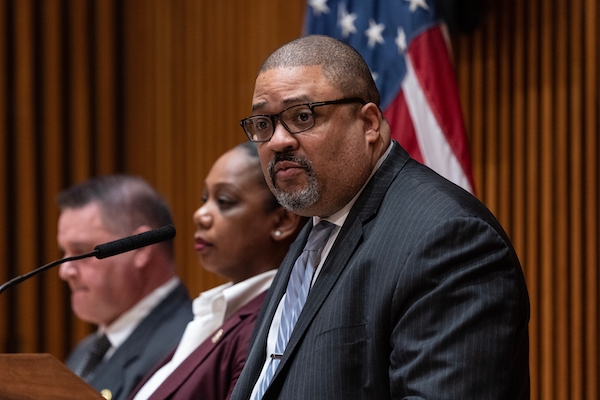Politics
BREAKING: Judge Deals Massive Blow To Alvin Bragg’s Case, Delays Key Decision

The future of President-elect Donald Trump’s hush money case hung in the balance Monday morning as Manhattan Judge Juan Merchan and District Attorney Alvin Bragg discussed with Trump’s lawyers how to proceed. It looks like observers will have to wait around for another chapter.
Merchan signaled Tuesday that he would postpone a decision on whether to scrap the case entirely given the Supreme Court’s immunity ruling, the Associated Press reported. Attorneys for Trump, who was previously convicted on 34 felony counts, have called for a dismissal and cited his successful election and need to run the country. The unprecedented nature of a future president being the first to face sentencing for a criminal conviction has left Merchan and Bragg, both seen by Trump as political foes, between a rock and a hard place.
YOURS FREE: Claim Your ‘Trump Victory’ Coin NOW!
Because of the high court’s ruling that sitting and former presidents are immune from official acts, Merchan told Trump’s lawyers he would be delaying a decision on how to proceed until November 19th. According to emails filed in court, Trump attorney Emil Bove had requested a delay over the weekend, saying it is “necessary to avoid unconstitutional impediments to President Trump’s ability to govern.” That request was ultimately agreed to by prosecutors in Bragg’s office.
The specter of criminal trials hung over President Trump’s entire campaign, and none more so than the hush money trial. In May, a Manhattan jury convicted him for falsifying business documents to hide a $130,000 payment to adult film star Stormy Daniels to quell rumors of an affair. The payment, made just before the 2016 election, should have been reported as a political campaign expense, Bragg’s attorneys argued in court. That reasoning was previously dispelled by the Federal Election Commission which found that the payment did not amount to an in-kind expense.
One month after the verdict, the Supreme Court ruled that presidents cannot be criminally charged for official acts. Lawyers for Trump argue his authorization of the payment from the Oval Office qualifies it as such. The defense throughout the trial also took issue with testimony by Michael Cohen, a convicted liar and felon, and evidence wrongly given to the jurists. Prosecutors disagreed and said only “a sliver” of the evidence in their case was in dispute.
Cohen claimed he made the payment personally and was later reimbursed by Trump after a delay. The payment was made when Trump was a private citizen, but Cohen said discussions about a reimbursement continued from the Oval Office. Despite questions about whether his payment to Cohen made shortly after the fixer’s payment to Daniels would qualify as an official act, legal observers believe it’s a likely scenario that a court may intervene to avoid the spectacle of an incoming president being sentenced to prison time.
(BREAKING: Buying Frenzy Causes Costco To Sell Out Of Gold Bars)

